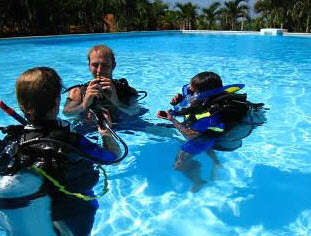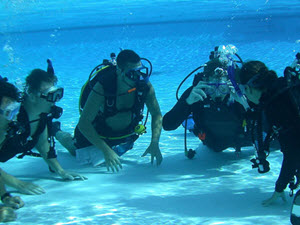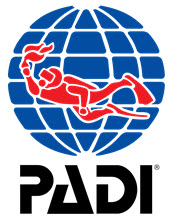 Scuba diving is a fantastic hobby that gives you access to an entirely new world. Unfortunately many people put of getting certified because they think it is very expensive or hard. The fact is that although scuba diving gear can be expensive, scuba diving as a hobby doesn’t need to be. You can often rent equipment for a fairly low price and by renting you do not need to bring your own equipment on your travels. Getting certified doesn’t have to be expensive either. It is usually possible to become certified for $300-400. That is a one time fee and if you choose a well respected organization such as PADI you will then be able to use your certification all over the world.
Scuba diving is a fantastic hobby that gives you access to an entirely new world. Unfortunately many people put of getting certified because they think it is very expensive or hard. The fact is that although scuba diving gear can be expensive, scuba diving as a hobby doesn’t need to be. You can often rent equipment for a fairly low price and by renting you do not need to bring your own equipment on your travels. Getting certified doesn’t have to be expensive either. It is usually possible to become certified for $300-400. That is a one time fee and if you choose a well respected organization such as PADI you will then be able to use your certification all over the world.
You can either choose to get certified by enrolling in an a full time program on your vacation or by doing it after hours where you live. If you live in a more rural area it is possible that there will not be an instructor near you and in that case you will need to do it on a vacation. Both methods have their strengths and weaknesses.
Getting certified on your vacation
 Getting certified on your vacation is often cheaper than doing it at home. This is due to a number of reasons. Among these you find that rents and wages often are lower in tropical countries and that Scuba school in tourist destinations get more business than most Scuba schools in the UK. The competition between different schools is also often fiercer on tourist destinations.
Getting certified on your vacation is often cheaper than doing it at home. This is due to a number of reasons. Among these you find that rents and wages often are lower in tropical countries and that Scuba school in tourist destinations get more business than most Scuba schools in the UK. The competition between different schools is also often fiercer on tourist destinations.
Getting certified while on vacation means that you got time to devote to your training, that you get to train in warm tropical waters and that there will be colorful fish and corals to see while you train.
One drawback with getting certified on your vacation is that the quality of the classes usually is lower than the quality of the classes at home. This is due to the fact that it is easier to dive in tropical waters and courses designed to prepare a diver to dive in our colder waters therefore always will be more challenging.
Getting certified at home
 Getting certified at home will usually be more expensive but will also make you a more knowledgeable diver. Since these courses often span over a longer period of time you will get more time to study the diving manuals etc and learn what you need to learn pass the exams. If you use that time wisely most of your knowledge will be better absorbed and you will remember it better than you otherwise would. Getting the certification at home will also prepare you for diving in cold water. Something that a class in tropical waters will not do. If you received your certification in a tropical country and want to dive in the UK I strongly recommend that you make a couple of dives with an experience instructor before you go down with a less experience diver. This will make you prepared for some of the unique challenges that colder water faces you with.
Getting certified at home will usually be more expensive but will also make you a more knowledgeable diver. Since these courses often span over a longer period of time you will get more time to study the diving manuals etc and learn what you need to learn pass the exams. If you use that time wisely most of your knowledge will be better absorbed and you will remember it better than you otherwise would. Getting the certification at home will also prepare you for diving in cold water. Something that a class in tropical waters will not do. If you received your certification in a tropical country and want to dive in the UK I strongly recommend that you make a couple of dives with an experience instructor before you go down with a less experience diver. This will make you prepared for some of the unique challenges that colder water faces you with.
Drawbacks of getting your certification at home include that you might spend a lot of time in pools where there is nothing to see and that you are limited to certain times of the year when the water is warmer to get certified. You can get certified any time of the year but it is harder to concentrate in colder water and I therefore do not recommend that you make your first dives in winter water. I did and wish i hadn’t.
Which organization should I get certified with
 There is a number of different organization that offer scuba diving certification. All of the organizations have their own network of instructors and scuba diving shops. You need to choose an organization that is well established in the area where you want to dive. If you want to dive in different places all over the world or if you haven’t a certain destination in mind I recommend that you get PADI certified. PADI is established all over the world. If you think you will do most of your diving in a specific area it is however possible that another organization is a better choice for you.
There is a number of different organization that offer scuba diving certification. All of the organizations have their own network of instructors and scuba diving shops. You need to choose an organization that is well established in the area where you want to dive. If you want to dive in different places all over the world or if you haven’t a certain destination in mind I recommend that you get PADI certified. PADI is established all over the world. If you think you will do most of your diving in a specific area it is however possible that another organization is a better choice for you.

